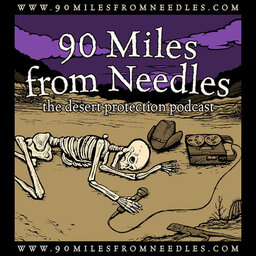S2E16: Protecting Desert Bighorn Sheep from Habitat Loss and Disease
About The Guest(s):
Dr. Christina Aiello is a bighorn sheep biologist and research associate with Oregon State University. She has dedicated her career to studying and conserving desert wildlife, particularly desert tortoises and desert bighorn sheep. With a focus on the Mojave Desert region, Dr. Aiello's research examines the impacts of habitat loss, fragmentation, and climate change on bighorn sheep populations.
Summary:
Dr. Christina Aiello joins host Chris Clarke to discuss the conservation of desert bighorn sheep in the Mojave Desert. They explore the threats facing these iconic animals, including habitat loss, fragmentation, and the spread of respiratory diseases. Dr. Aiello highlights the importance of maintaining genetic diversity and connectivity between bighorn populations to ensure their long-term survival. They also discuss the potential impacts of the proposed high-speed rail project on bighorn sheep movement and the need for wildlife crossings to mitigate habitat fragmentation. Despite the challenges, Dr. Aiello remains hopeful and inspired by the resilience of desert wildlife.
As a bonus, desert writer Louise Mathias offers a related commentary on the likely impact of the proposed Soda Mountain Solar Project on bighorn sheep in Mojave National Preserve.
Key Takeaways:
- Desert bighorn sheep require rocky, high-elevation terrain with access to water and forage.
- Habitat loss and fragmentation from urbanization and infrastructure development are major threats to bighorn sheep populations.
- Bighorn sheep exhibit natural movements and rely on connectivity between habitats for genetic diversity and survival.
- Wildlife crossings, such as overpasses, are crucial for facilitating bighorn sheep movement and maintaining population connectivity.
- Bighorn sheep are susceptible to respiratory diseases, which can be introduced through contact with domestic livestock.
- Genetic diversity plays a vital role in bighorn sheep's ability to resist and recover from diseases.
- The proposed high-speed rail project in the Mojave Desert will further fragment bighorn sheep habitat and hinder their movements.
- Protecting and improving degraded habitats can still benefit wildlife, as they demonstrate resilience and adaptability.
Quotes:
- "Bighorn sheep will make use of a bad situation that we hand them and get as much from that landscape as they can." - Dr. Christina Aiello
- "Wildlife crossings are a public health measure for bighorn sheep." - Dr. Christina Aiello
 90 Miles from Needles: the Desert Protection Podcast
90 Miles from Needles: the Desert Protection Podcast


